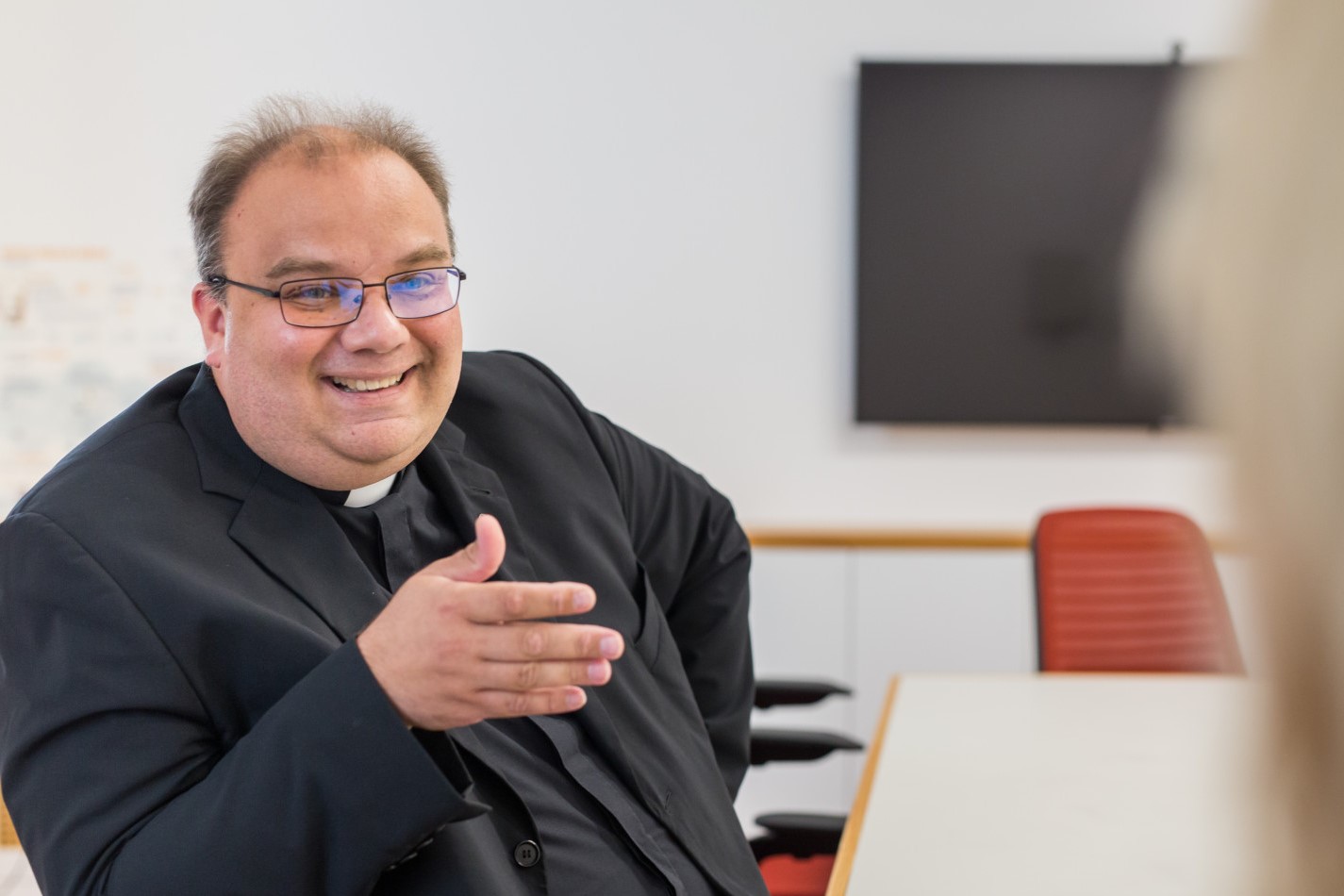
‘Your roots within’ – letter of Father Viktor Zsódi Hungarian Provincial
- 2025. Sep. 14.
Dear CM leaders,
Dear students,
On the feast of St. Joseph Calasanz, I would like to ask you a simple question, one that concerns every person’s life. Imagine your phone. What are the two things it constantly needs in order to function? Charging and Wi-Fi.
If the battery is dead, it is useless. If there is no internet, most of its functions make no sense. We are constantly searching for a socket, a password, a connection. As a parallel, let us now ask ourselves: what about us? Where do you connect in order to be recharged?
What is your personal Wi-Fi? What is the foundation to which, when you are connected, you can say: “Okay, now I am stable, now I can be myself”?
Just as a phone only works properly when it is charged and connected, so too our life is only stable when it has a foundation that sustains it—especially in times of difficulty.
We must admit that our life is full of storms—not necessarily physical ones, but those we experience daily. For example, the storm of the pressure to measure up: to be good enough at school, among friends, in sports, in the online world.
Then often comes the storm of anxiety about the future: what will I become when I grow up? Will I be admitted to university? Will I succeed in my final exams? And finally, there is the search for our own self: who am I really, behind the filters, roles, and expectations?
In these storms, we instinctively look for something to hold on to, roots to cling to. We try to root ourselves in popularity, in the number of likes, in good grades, in a trendy outfit, or in belonging to a certain group. Yet these roots are shallow. As soon as the wind changes—a bad grade, an argument with friends, a hurtful comment—we feel that the ground is shaking beneath us.
In this situation comes the new motto of the Piarist schools for the 2025/2026 academic year: “Your roots within.” This is not another task to accomplish, not another requirement on a list, but rather an invitation—an invitation to a different way of being, a different kind of stability.
The motto points to a foundation that does not depend on our performance or on external circumstances; a foundation that is solid, that gives a true “identity and inner strength,” enabling us to withstand even the strongest storms. But who is this Foundation, who is this “Him”? What is this soil in which we can root ourselves so deeply and securely? And above all: why should this be any different from anything else we have clung to so far?
When the motto says “in Him,” based on the Letter to the Colossians, it clearly refers to Jesus Christ (cf. Col 2:7). In this letter, the Apostle Paul presents a stunningly rich image of Jesus. When a false teaching arose in the Colossian community that sought to diminish Christ, Paul did not respond with a simple argument, but with an early Christian hymn, which was most likely already well known in many Christian congregations. This hymn is the key to understanding what kind of soil the motto invites us to root ourselves in.
First, the hymn says that Christ is “the image of the invisible God.” This does not mean He is a photograph of God. The Greek word signifies much more: Christ is the perfect, effective manifestation of God’s reality.
If you want to know what the God who holds the universe together is like, look at Jesus. He is God’s HD, 4K, live broadcast into our world.
Second, He is “the firstborn of all creation.” This does not mean He is the first in a sequence of creatures; it is a title denoting dignity and rank. He is the heir to the throne, the rightful Lord of the universe, who is not part of creation but stands above it.
Here comes the most astonishing part: “In Him all things were created, in heaven and on earth… all things were created through Him and for Him” (Col 1:16). This statement explodes our narrow ideas about faith and the world. Modern people tend to relegate faith to the private sphere: you believe in church, but in physics class or in the laboratory, the laws of science rule. Paul, on the other hand, declares that the object of faith, Christ, and the object of science, the world, are not in opposition but in a cause-and-effect relationship. Christ is not one actor among many in the world; He is the world’s “operating system,” its “source code.” The laws of physics, the spirals of galaxies, the DNA code in cells, the beating of your heart—all function according to His logic, His creative Word. He is the One who “is before all things, and in Him all things hold together” (Col 1:17). He is the gravitational force that prevents reality from falling apart.
If this is who Jesus Christ is, then
rooting ourselves in Him is not a sentimental religious feeling. It means connecting ourselves to the deepest, most solid foundation of reality itself.
We are not escaping into an alternative reality but discovering the very foundation upon which all existence rests.
Yet roots are not only important in storms. Roots are what nourish, what give life, what connect to the source and make us part of a greater system. Without roots, there is no life.
If our roots are in the right soil, this does not mean a passive or static state. Where there are strong roots, there is growth and fruitfulness. The Apostle Paul describes exactly what such a growing life looks like.
First of all, the foundation of growth is gratitude: “abounding in thanksgiving” (Col 2:7). When you realize that your stability, your worth, your security are not your own achievement but the gift of the Lord of the universe, you are freed from the compulsive need to prove yourself. A grateful person does not need to fight constantly for recognition, because they know they have already received the most important thing.
Second, growth manifests itself in concrete deeds: “Clothe yourselves with the new self” (Col 3:10). This “new self” is not mystical but very practical. It is worth noting that the virtues Paul lists are all relational: “compassion, kindness, humility, gentleness, patience” (Col 3:12). Why? Because a life rooted in Christ is not the life of a solitary tree. The motto does not say: be a lonely, strong oak in the middle of a field.
The image is more like a forest, where the trees’ roots intertwine beneath the ground, holding one another up even in the greatest storm. Paul’s answer is communal: Christ is the Head of the Body, and we are members of one another.
What does this mean in your life? To be compassionate with the classmate who gets on your nerves. To be patient with your parents when they do not understand you. To forgive the one who gossiped about you or hurt you. To be humble when you are the best at something, and not to look down on others. And
above all, love, which “binds everything together in perfect harmony” (Col 3:14), which holds all these together. The surest sign of your growth is how you treat the people around you.
The Apostle Paul concludes his line of thought with a breathtaking promise: “your life is hidden with Christ in God” (Col 3:3). Think how different this is in today’s world of “shop-window lives,” where everything must be shown, posted, where life becomes a continually edited performance exposed to the public. In this culture, Paul’s message is revolutionary: your truest self, your deepest identity, who you really are, is not subject to the world’s judgment, is not on display, but is safely hidden.
You do not need to constantly prove yourself or perform in order to be valuable. Your value is already guaranteed, hidden with the Lord of the universe.
This realization brings the greatest freedom. Freedom from failure, because the most important thing can no longer be lost. Freedom from criticism, because your true worth is not determined by others’ opinions. Freedom from anxiety, because your future is in the best possible hands. Paradoxically, it is precisely by being hidden that you are able to act visibly and boldly in the world. Since you no longer need to fight for your own survival, you are free to take risks, to love, and to serve.
Our motto—“Your roots within”—is ultimately a call. Your task is to remain in Christ, and He will sustain you. For your life is already hidden in the hands of the King of the universe, in the safest place in the world. May this school year bring us the experience of being ever more deeply connected to Christ and living ever more freely in Him!
Budapest, August 25, 2025
Fr. Viktor Zsódi, Sch. P.
Provincial

From: Hungarian Province of the Order of the Pious Schools
Photo: Attila Lambert, Magyar Kurír
